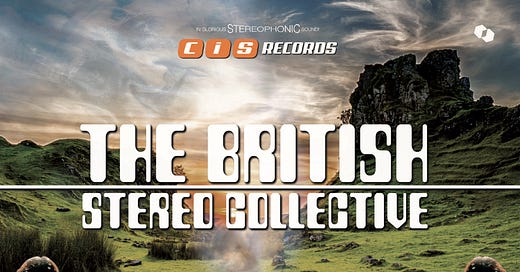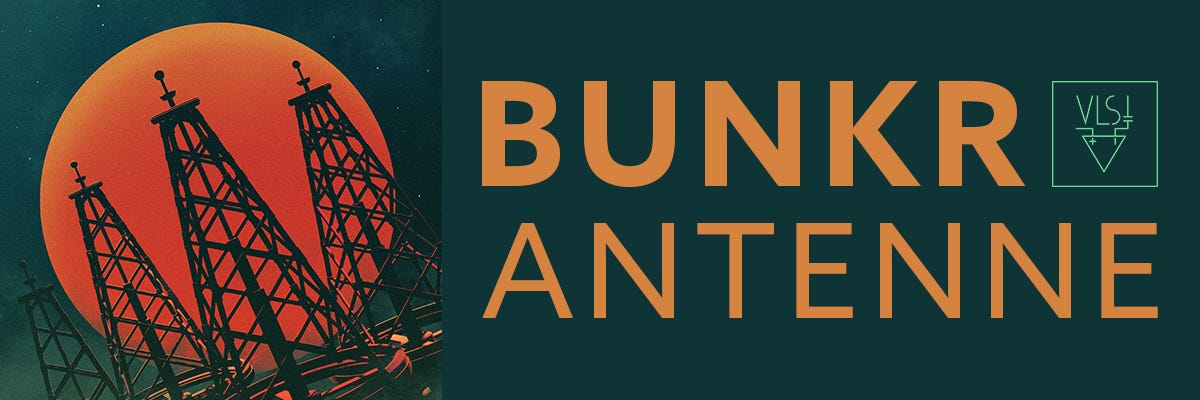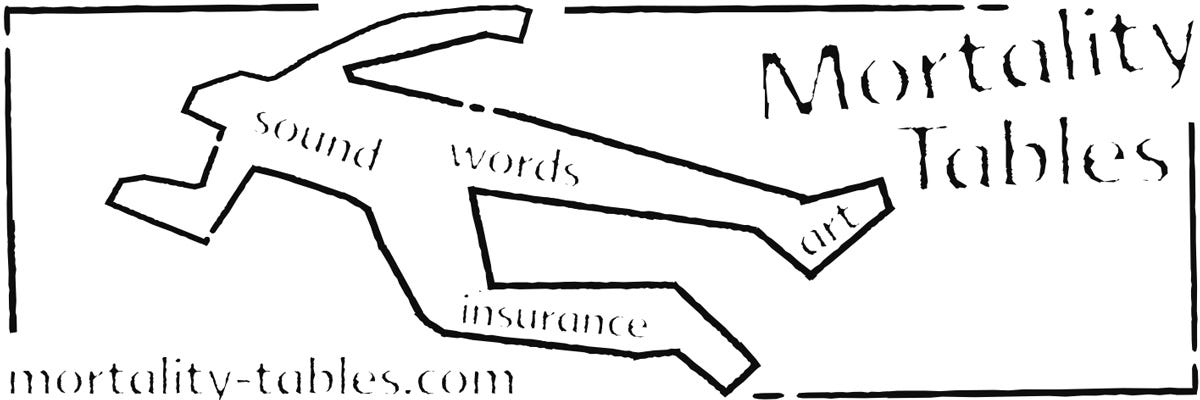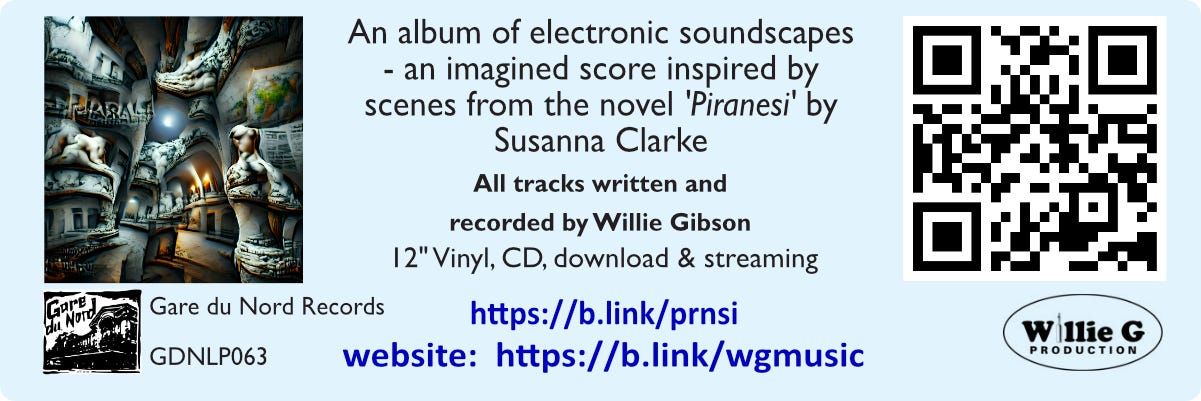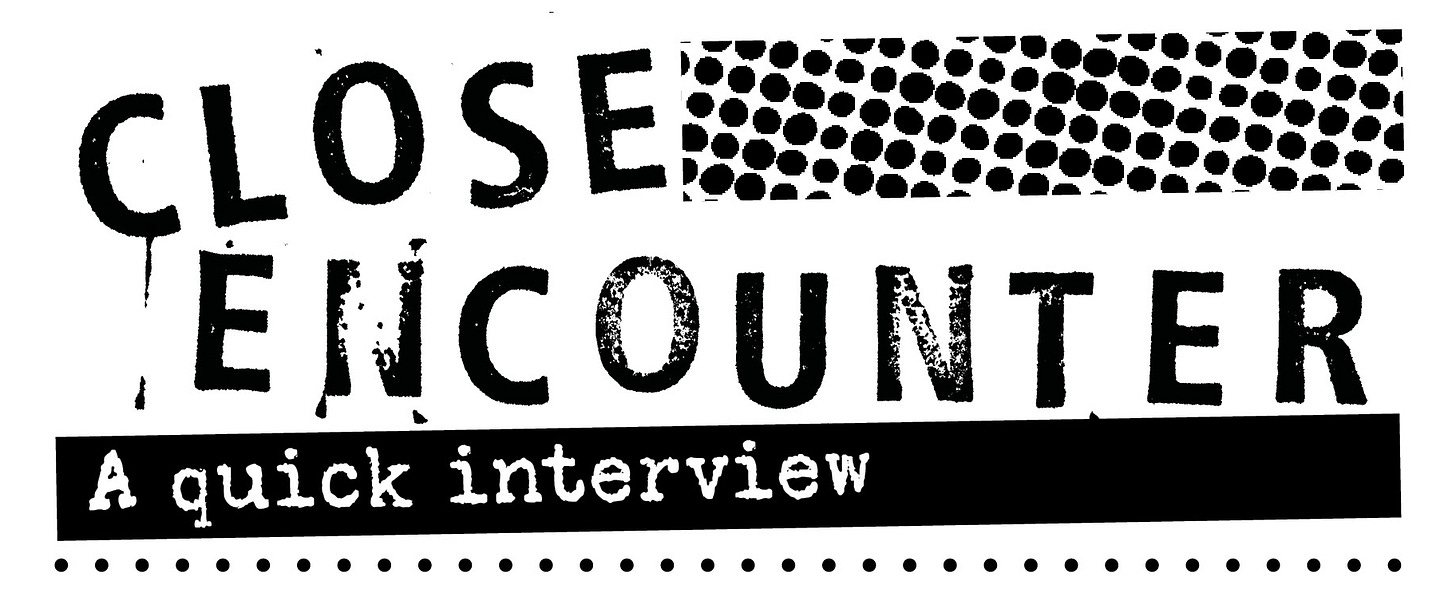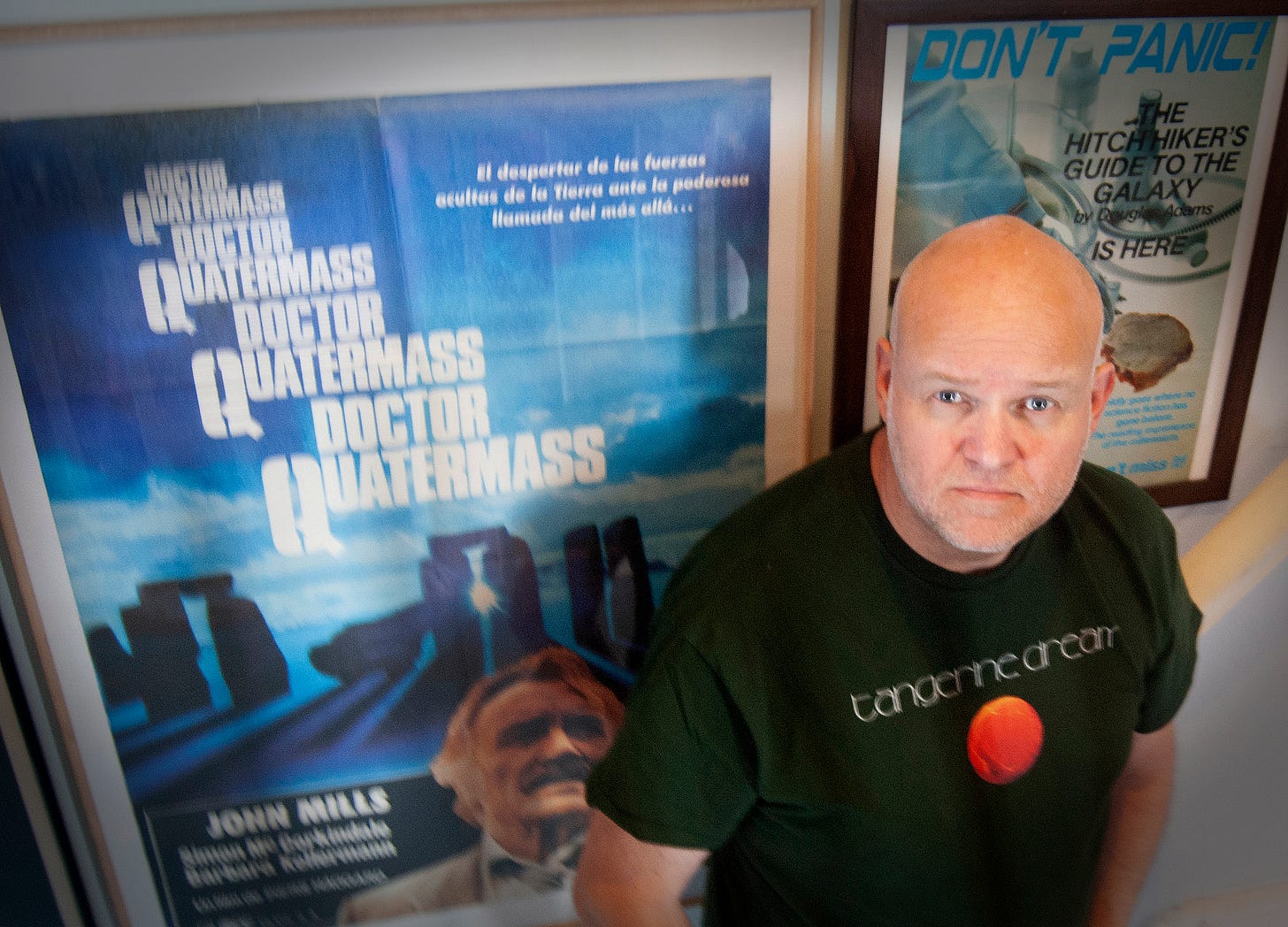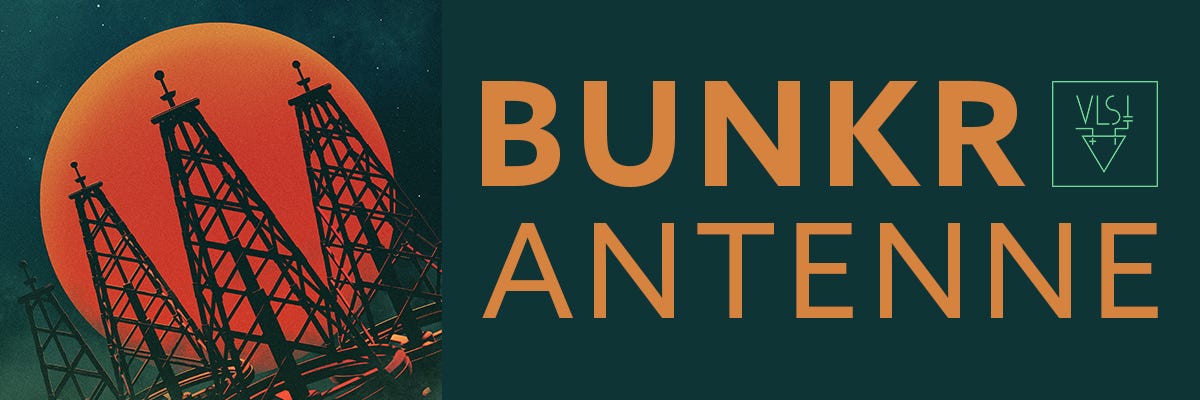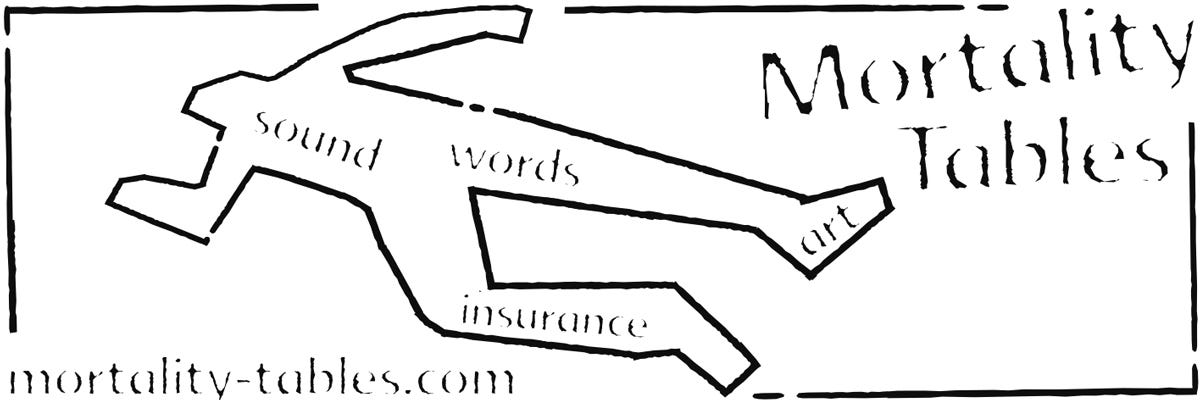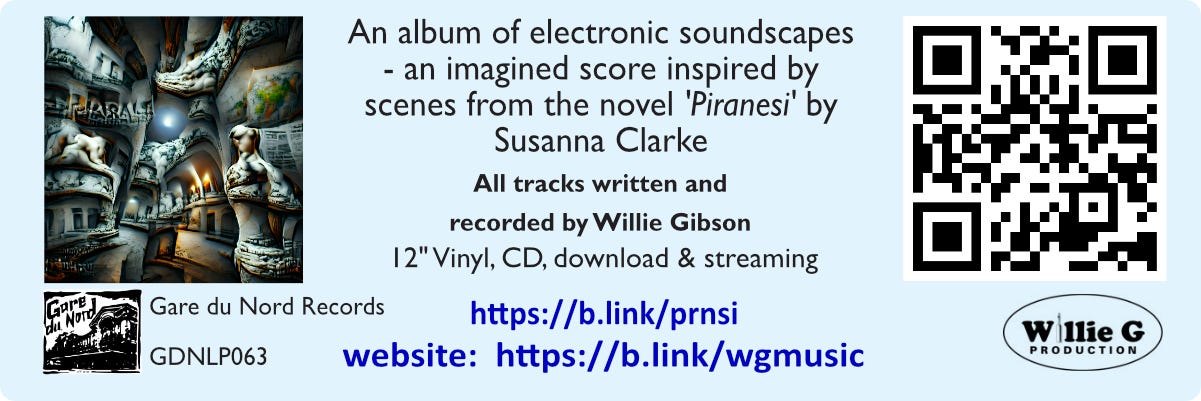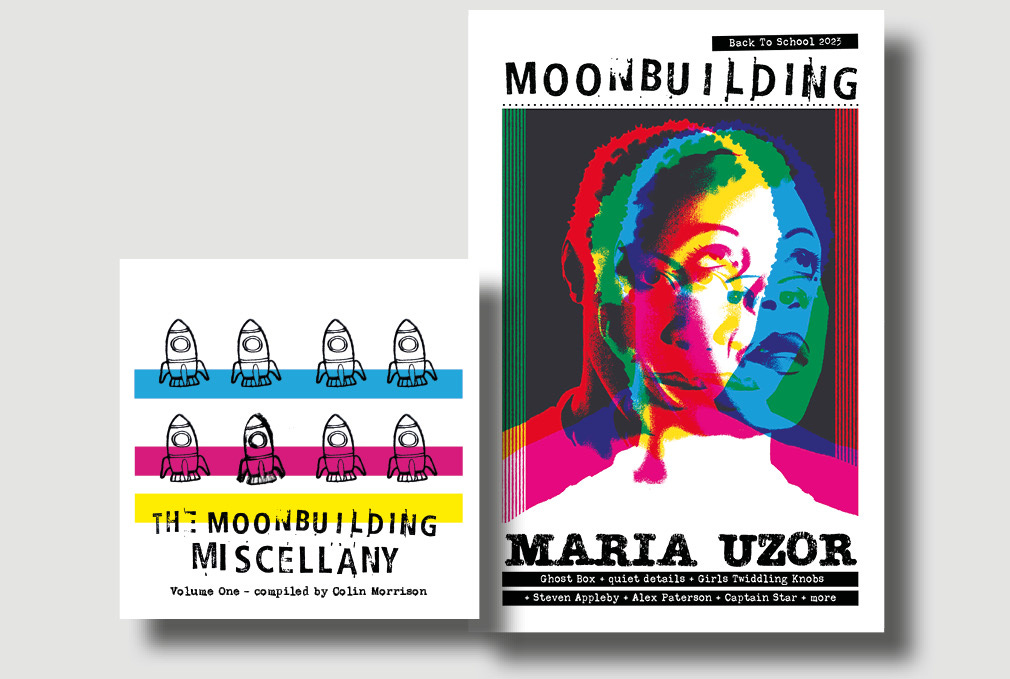Issue 24a / 28 June 2024
In part one of this week's DIY electronic music bulletin... Album Of The Week: The British Stereo Collective's ‘Iniquitous’ + Phil Heeks interview
I have news. There’s a new issue of Moonbuilding (print version) on the way. Almost. There’s half a dozen pages to finish off then it can go to the printers. Which should happen in the next couple of weeks, all things being equal. It’s the summer issue, totally missed winter and spring because of, erm, outside forces. Like spending too many hours on Moonbuilding Weekly. The cover of the new issue is someone I’ve wanted to on there since the very first issue. Can’t wait for the big reveal. Should be able to do that quite soon.
In other news, Moonbuilding Weekly is going to be a one mailout a week kind of guy over the summer. So don’t panic next week if there’s nothing from us on Friday morning. Friday afternoon is where it’s at. What’s happening to the mailout? It’s going to a Greek island to sun its ass. Full service will be resumed in September when it’s had a bit of a rest. That said, I do enjoy my early morning panic each week so I might have a surprise newsletter or two over the summer, just to keep you on your toes.
Righto. Let’s crack on with this week’s offering.
Neil Mason, editor
moonbuildingmag@gmail.com
Issue 24 Playlist: See this afternoon’s mailout
The Moonbuilding tip jar: ko-fi.com/moonbuilding
***ADVERTISE HERE***
Email moonbuildingmag@gmail.com
BRITISH STEREO COLLECTIVE ‘Iniquitous’ (Castles In Space)
The genius of The BBC Radiophonic Workshop lay in the medium it used to spread the musical word. Unique among the European sound studios, it was decidedly pop culture in its approach. Not that Daphne Oram saw it like that when the Workshop was founded in 1958. She saw what they did on par with the work of Stockhausen in Cologne, Luciano Berio in Milan and the Pierres, Henry and Schaffer, in Paris. The BBC had other ideas. While their counterparts on mainland Europe were also funded by their respective national public broadcasters, they made art and weren’t put to work like Daphne and her crew of audio adventurers.
The reality was the BBC saw The Workshop as a way of saving money when it came to the provision of music for their growing output across TV and radio. Why would you have a full-size orchestra sat in a room for days on end (expensive) when a couple of people could make similar-ish sounds on new-fangled synthesisers (cheap).
What they didn’t count on was the work created and used for all manner of TV and radio shows would form the musical bedrock for an entire generation of future music makers. And all from just watching TV. Now that was public service broadcasting. The influence was seismic. Delia Derbyshire’s famous ‘Doctor Who’ theme alone launched 1,000 (space)ships. The idea that TV was bad for you couldn’t have been further from the truth.
But it wasn’t just The Workshop that shaped a new musical generation. There was a pincer movement when it came to music on TV. Composers and musicians were making good money performing instrumentals for libraries such as KPM who would then hawk their wares as theme tunes or incidental music in the film and TV world. Again, why pay expensive composers and musicians exclusively when you could pick something up off the shelf? And pick they did. The famous signature tunes for shows like ‘Dave Allen At Large’, ‘Grange Hill’, ‘Grandstand’, ‘Superstars’, ‘Animal Magic’, Captain Pugwash’, ‘This Is Your Life’, Terry And June’, ‘Mastermind’, ‘All Creatures Great And Small’ and so many more were all library music.
This musical double whammy was unavoidable if you grew up watching television in the 70s and 80s, among those doing just that was a young Phil Heeks filling his ears.
Following 2023’s ‘Mystery Fields’, ‘Iniquitous’ is Phil’s second album of fictional TV themes, his homage to the music from the classic shows he grew up with and to the composers who shaped him musically. So we get ‘Through The Ages’, which tips the nod at Jarre’s ‘Equinox’, the push-tish drum machine of ‘Theme From “Iniquitous”’ which has that early 80s synthpop sheen, while the ‘Knight Rider’-y ‘Language And Culture (Educational Radio)’ is sure to raise a smile.
It’s all brilliantly done and there’s some great-sounding synthy goodness here, like on the pulsating ‘Future World’ and the swirling ‘Highway Inn’. There’s a handful of tracks that seem to transcend the conceit of this record. The sophisticated ‘Come What May (From “The Sins Of The Living”)’ with its shimmery choir is very classy indeed, and I love the towering ‘Astronautical (Theme from “Star Quest”)’. It’s a huge tune.
And here’s the thing, it’s easy to frame this kind of work as pastiche, but the very idea that people like Phil, and there are a lot of them, were soaking up all these influences when they were young, without even knowing, is rather magical. It’s made more so by the fact that so many of these people went on to make music of their own, shot through with the sounds of their formative years. Phil talks of how he has a genuine desire to compose period theme music for real. This is no spoof. This is for real. Stay tuned.
The British Stereo Collective’s ‘Iniquitous’ is out now on Castles In Space
BRITISH STEREO COLLECTIVE
Phil Heeks chats about his life-long love of a well-crafted TV theme tune, the influence of ‘Quatermass’, the power of the Radiophonic Workshop and his very early years spent bobbing up and down in a play pen to the ‘Joe 90’ theme
Photo: Dan Robbins
Interview: Neil Mason
Hello Phil, how’s things? What are you up to today?
”Hello, it’s all good. As usual, I am juggling the day job as a graphic artist with making music, although I do much more of the latter these days and, consequently, have a current backlog of three completed albums and three that are about 80 per cent done. Then it’s off into town and then off to do the school run.”
Who or what is The British Stereo Collective is?
”It’s a fictional organisation of composers and musicians working in a golden era of TV, although I now use the moniker for everything I do, even if it doesn’t fit the original TV conceit. Everything I do in the synth arena fits comfortably enough with the brand, so it’s just easier that way. The new album is about 60 per cent pure electronica and 40 per cent more traditional, but still created with synths, with the occasional addition of guitar and a shake of the old tambourine.”
It’s a great name. Martyn Ware talks about wanting something that sounded “solid” when they came up with British Electric Foundation – “I imagined the logo looking like it had been carved out of stone on a giant office block from the 1930s,” he said. You seem to have done the same thing with your name?
”The whole thing stems from revisiting the 1979 ‘Quatermass’ series on Blu-ray in October 2019. I was so inspired by the atmosphere and the music that I decided, having recorded synth music for years as Sublevel, to attempt the idea of a very specific side project in the vein of the BBC Radiophonic Workshop. This ‘side project’, which was probably originally intended as a one-off, has since become my full-time alter-ego.”
Did you consider other names for the project?
”Absolutely. I originally wanted to call it The British Rocket Group, which is the organisation headed by Bernard Quatermass, but when I discovered that was already taken, I went with The British Space Society. In fact, the first album ‘Mystery Fields’ was originally submitted and accepted with that particular name until Kev Oyston from The Soulless Party informed me that name was also taken! So it was a process of collating certain kinds of words and then Googling them to check there was no match. The album was originally intended to be eponymous until I had a rethink and named it after the track ‘Mystery Fields’.”
It does seem like The British Stereo Collective is an institution. Was that the idea?
”It’s totally intended to evoke The BBC (British) Radiophonic (Stereo) Workshop (Collective), although it’s wider reaching to encompass the varied kind of themes compilations you would find mainly in charity shops these days.”
‘Iniquitous’ is a long-awaited follow-up to ‘Mystery Fields’. What kept you?
”Funnily enough ‘Iniquitous’ was actually completed before ‘Mystery Fields’ was released. Two tracks were recorded at the 11th hour in the week before the album was mastered. ‘Wires Are Dangerous Too’ was wrapped up two days before mastering and ‘Iniquitous End Titles’ was recorded that same week when it occurred to me that the brief refrain in the middle-eight section of ‘Iniquitous’ would make a nice end titles track in its own right.”
I’m guessing you’re a TV fan? What are you watching at the moment?
”I’m actually more of a movie fan. I obviously watched a lot of TV when I was younger, but I spend so much time writing and recording now that I watch very little TV, although over the past year I have enjoyed cracking out the DVDs and looking back at ‘Survivors’, ‘The Avengers’, both old and ‘New’, ‘Blake’s 7’, which I appreciate way more now than I did as a kid, ‘The Prisoner’ and ‘Space: 1999’, the latter is never off my viewing radar. All I have really committed to it recent years is ‘Peaky Blinders’, ‘The Responder’, ‘Cold Call’ and a couple of ‘Star Wars’ shows!”
What’s your earliest memory of watching TV?
”My earliest memories are of ‘Play School’, ‘Andy Pandy’ and ‘Mary, Mungo And Midge’, but I am told I used to bob up and down in my play pen to the ‘Joe 90’ theme, To this day, I still love it, but I love the end titles arrangement more. In my later childhood it was ‘Space: 1999’, ‘Starsky And Hutch’, ‘Tales Of The Unexpected’ and ‘Doctor Who’, among countless others.”
Do you have favourite themes from your formative years?
”Where do I even begin? ‘Black Beauty’, ‘Robinson Crusoe’, ‘Tales Of The Unexpected’, ‘Doctor Who’, ‘Starsky And Hutch’, ‘Flambards’, ‘Distant Hills’ from ‘Crown Court’, ‘The Tomorrow People’, ‘The Persuaders’, ‘Jesus Of Nazareth’, ‘The Waltons’, ‘The Gallery’ from ‘Vision On’, ‘World In Action’, anything by Laurie Johnson, Freddie Phillips’ music from the Trumptonshire Trilogy and pretty much everything from the Gerry Anderson shows.”
Any particular favourite composers?
“TV-wise, Barry Gray, Paddy Kingsland, Laurie Johnson and Ron Grainer, among others. I also originally discovered Kraftwerk’s ‘Autobahn’ and Vangelis’ L’Enfant’ thanks to their use as TV themes.”
Your work is an homage to those themes, what’s the appeal of them for you?
”It’s very much an homage to that era, although there are occasional deliberate homages to specific TV themes in terms of style and instrumentation. But it’s never spoofing, even though I am self-aware enough to recognise that some of it might sound tongue-in-cheek to some ears. But it all stems from a genuine desire to compose theme music in the 60s, 70s and 80s for real. In the absence of a TARDIS or a customised DeLorean, this is the next best thing. Neil Brand argued the case for TV music being the real soundtrack of our lives in his excellent ‘The Sound of TV’ series. I think that definitely applies to me, in tandem with the pop music I grew up with.”
Do people ever think these are themes to real TV shows?
”I have had people say that they couldn’t believe they weren’t real and even had someone pissed off that they couldn’t watch any of these shows! Ha-ha. I knew I was on to something when Colin from Castles in Space contacted me at the mastering stage to check on the copyright situation of the idents on ‘Mystery Fields’! That was extremely reassuring.”
When you’re making these, what comes first with you? The music or the title?
”Always the music, sometimes written in my head, other times at the piano or keyboard. Then I decide what the music evokes as a TV show. Sometimes I write to an imagined TV show, but it doesn’t usually have a title at that stage. Some tracks are obviously influenced by existing themes from the past in the sonics and arrangement but all compositions are entirely original works.
“On many occasions I have retro-fitted a composition I already had in hand by slotting it into an arrangement that evokes an old TV show. For instance, ‘Highway Inn’ was the first melody I ever wrote, aged 12, a couple of years before I could even play keyboards. I took piano lessons to be able to play what I was writing, but quit during Grade 3. Some 40-plus years later I adapted it to an arrangement that made it sound like ‘Crossroads’. Similarly ‘Sandon Village Tales’ was adapted from an existing composition written circa 1994.”
How far do you get with thinking about the actual shows you dream up?
”They are usually only vague guidelines, just enough to write a brief synopsis to put the music in context. Although on more recent examples, the shows have been fleshed out in much greater depth and detail. But the music still comes first and foremost. That’s far more important to me that the conceit of the fictional shows the music relates to.”
Tell us about ‘Iniquitous’, what sort of show was that?
”I describe ‘Iniquitous’ as a noir-ish delve into the dark underbelly of an alternate reality, a world that exist alongside our own but, for most, remains unseen and unknown. I guess it’s kind of a hybrid of ‘The Tomorrow People’ and something more adult.”
Tell me a little about the theme tune? It has a hint of ‘Being Boiled’ doesn’t it?
”The actual inspiration and jumping off point was ‘Mr X’ and ‘We All Stood Still’ by Ultravox. This was another example of adapting an existing composition, which was originally written as strident and choppy for string quartet and, alternately, for lounge piano quartet, into a new arrangement.”
What did you grow up with musically? Where does all this come from, inspiration-wise?
”I grew up balancing my love for chart music with the flip side of an obsession with TV and film music, bolstered by the Geoff Love albums and by my exposure to the music of John Williams, who is my all time musical hero. Jeff Wayne’s ‘War Of The Worlds’ also played a hugely influential part in how I arrange and produce.
“The TV stuff is just one aspect of what I do now as The BSC as I don’t really like to repeat myself, but it’s so much fun that I indulge the TV themes now and then in between other releases that don’t share the TV theme conceit, such as my last release ‘In The Shadow Of The Bomb’ and my next which is more of a free-form Tangerine Dream affair in collaboration with Mark Price of ShadowLab.
“I also had the influence of two older brothers with vastly opposing tastes. So from one I got soundtracks, ABBA, The Beatles and so on, and from the other I got The Ramones and Springsteen, among others. Probably my favourite pop era was the period that encompassed all the new wave stuff and the British ska movement. Then in my mid-teens I was deep-diving into Jean-Michel Jarre, Vangelis, Tangerine Dream and Mike Oldfield. It only recently occurred to me that it wouldn’t have been cool to be into theme tunes as a kid, while navigating the various contemporary music tribes, but I have no recollection of ever contemplating this at the time.”
There’s so many of these shows that I’d watch… ‘The Van de Berg Mysteries’, ‘Tech Talk’, ‘Star Quest’… do you have any favourite shows you’ve dreamed up?
”From this album, I like the idea of ‘The Sins Of The Living’ and ‘The Fire Keepers’ and from ‘Mystery Fields’, I like ‘The Ghosts Of Fleet Forest’ and ‘Space Guardians’, which I fleshed out significantly in the booklet for the expanded CD of that release.”
There’s a couple of local TV idents in here too. Which TV region did you grow up in? I had Anglia TV with the silver knight on horseback with the big standard flag! Hard to forget
”For me it was ATV, which I largely associate with ‘Tiswas’ and I just realised I am wearing my ‘Tiswas’ baseball shirt as I answer this! I credit Sally James with the fact that I can still quote the Tiswas address, Birmingham B1 2JP. As for Anglia, that immediately makes me think of ‘Live... from Norwich... It’s the quiz of the week!’.”
There’s some great theories about how The Radiophonic Workshop influenced an entire generation of future music makers without them really knowing through TV themes. Did they get to you, beyond ‘Doctor Who’?
”I wasn’t consciously aware of much of The Radiophonic Workshop’s work as a kid, with the exception of Paddy Kingland’s ‘Reg’, which was the B-side to ‘Doctor Who’, which I absolutely love, and Peter Howell’s ‘Astronauts’, which is also a ‘Doctor Who’ B-side. ‘The Space Guardians’ theme was my attempt to create something similar to ‘Astronauts’ although most mistake it for Jean-Michel Jarre due to the Korg Minipops rhythm track and the phased strings. Peter Howell did a wonderful demo of how the ‘Doctor Who’ theme was created on a show called ‘The Music Arcade: Electricity in Music’ in 1982. A similar demo was done by Mike Oldfield for Blue Peter in 1979, which I cite as one of the most influential moments for me regarding multi-tracking and recording processes.”
There’s a track here, ‘Language And Culture (Educational Radio)’. Radio was just as important as TV for getting this stuff out there wasn’t it?
“In all honesty, it just seemed to fit as an educational radio theme, but it could just as easily have been for TV. It was originally going to be more on the nose in a Radiophonic style, but I reconsidered when I feared it might potentially be a bit too twee and a bit too ‘spoofy’. In it’s final iteration it’s kind of Vangelis meets Blancmange.”
It’s funny what sticks with us isn’t it? Your album ‘Our Feature Presentation’ looks at stings and jingles from the world of cinema. I don’t know many people who don’t know the Pearl & Dean music. How come that sort of thing stays with us do you think?
”I have always called ‘Our Feature Presentation’ my most personal album, although it’s an oddity within that description as personal albums are usually more about the artist themselves, but it’s steeped in my memories of hours spent in the dark – in the late 70s and early 80s – in a cathedral of red velvet and drapery, anticipating the ‘Feature Presentation’. I am a huge fan of the various pieces used to soundtrack the Rank Screen Advertising idents, particularly Francis Monkman’s ‘Release Of Energy’, which was the initial inspiration for what was originally intended only to be a short EP, but ballooned to a whole album.”
Why do you think so many people who make synthesiser music, the music of future, like to look backwards?
”For me, I guess I grew up in the time when all this stuff was happening, so I was experiencing the future first-hand. It’s hard not to have affection and nostalgia for that. It was quite a privilege to grow up experiencing ‘space music’ as it happened and at such an impressionable age! Jarre’s ‘Oxygene 4’ was a sonic revelation and just screams summer 1977 for me to this day. I love the early analogue sounds which, by comparison to some of the harsher digital sounds from the 1980s, sound positively organic by comparison. Vangelis’ ‘Blade Runner’ score proved that synths could be warm, lush and organic, which is why I believe that score hasn’t dated. It also didn’t hurt that he was a genius.”
Everything was just better in the old days, wasn’t it?
“I’ve yet to think of a good reason why we ever left the 1970s.”
For more British Stereo Collective, visit thebritishstereocollective.bandcamp.com
***ADVERTISE WITH US***
Email moonbuildingmag@gmail.com
A MESSAGE FROM THE MOTHERSHIP
MOONBUILDING ISSUE 4, £5 (+P&P). GRAB YOURS WHILE STOCKS LAST … MOONBUILDING.BANDCAMP.COM
The latest issue of MOONBUILDING is full to the gills with the good stuff. On the cover, star-in-the-making Maria Uzor, we profile label-of-the-moment quiet details, there’s an incredible interview with Captain Star creator Steven Appleby, and Ghost Box’s Jim Jupp gets busy with our There’s A First Time For Everything questions.
We review a big pile of releases from labels including Castles In Space, Woodford Halse, Persistence Of Sound, Assai, Ahora, DiN, Werra Foxma, Ghost Box and many more. There’s a column from The Orb’s Alex Paterson and the world-famous Captain Star cartoon strip.
This issue’s CD is ‘The Moonbuilding Miscellany – Volume One’, which is put together by CiS supremo Colin Morrison. It’s a belter featuring tracks from the likes of Lo Five, Lone Bison, Twilight Sequence, Ojn, NCHX and more.
Moonbuilding Weekly is a Castles In Space publication.
Copyright © 2024 Moonbuilding

